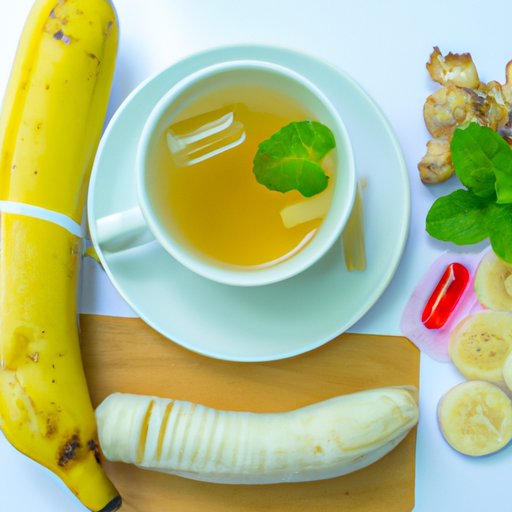Introduction
Stomach upset is a broad term used to describe a range of digestive issues such as nausea, indigestion, heartburn, and abdominal pain. It’s a common issue that many people suffer from, but it can be difficult to manage. Fortunately, there are lifestyle changes you can make and foods you can eat to help ease the symptoms of stomach upset.

Incorporating Probiotics into Your Diet
Probiotics are beneficial bacteria that live in your gut and help maintain a healthy balance in your digestive system. Research has shown that probiotics may help reduce symptoms of stomach upset such as bloating, gas, and diarrhea. They can also help boost your immune system and improve overall gut health.
There are several ways to incorporate probiotics into your diet. Yogurt is one of the most popular sources of probiotics, since it contains live cultures of beneficial bacteria. Other sources of probiotics include fermented foods such as sauerkraut, kimchi, miso, and tempeh. Supplements containing probiotics are also available.

Eating Bananas to Soothe Your Stomach
Bananas are rich in vitamins and minerals and are a good source of fiber. They are also known for their ability to soothe the stomach and relieve digestive discomfort. Research has found that bananas contain pectin, a type of soluble fiber that helps to absorb water in the intestines and form a gel-like substance that can help ease digestion. Bananas also contain prebiotics, which are food for the probiotics in your gut and help promote healthy digestion.
You can add bananas to your diet by eating them on their own, adding them to your smoothies or cereal, or baking them into muffins or breads. Bananas pair well with other fruits and nuts, so you can also create a delicious and nutritious snack by combining them with other ingredients.
Trying Ginger to Ease Nausea
Ginger is a popular remedy for nausea and vomiting, as it has been found to have antiemetic properties. Studies have found that ginger can help reduce nausea and vomiting caused by motion sickness, pregnancy, and certain medications. It can also help relieve indigestion and bloating.
Ginger can be consumed in a variety of ways. You can grate fresh ginger into your favorite dishes, brew it into tea, or take capsules containing powdered ginger. If you don’t like the taste of ginger, you can also find ginger extracts in liquid form that you can add to your drinks.

Drinking Peppermint Tea for Relief
Peppermint tea is another popular remedy for stomach upset. It has been found to be effective at relieving symptoms of indigestion, including bloating, gas, and nausea. Peppermint tea also contains menthol, which helps relax the muscles in the digestive tract and reduce cramping.
To make peppermint tea, steep one teaspoon of dried peppermint leaves in hot water for five minutes. You can also purchase pre-packaged peppermint tea bags if you prefer. Drink one cup of peppermint tea after meals to help soothe your stomach.
Consuming Bland Foods
When you’re suffering from stomach upset, it’s best to avoid spicy or greasy foods, as these can irritate your digestive system. Instead, opt for bland foods such as crackers, toast, oatmeal, boiled potatoes, and plain rice. These foods are easy to digest and can help settle your stomach.
Bland foods are also high in carbohydrates, which can provide quick energy and help restore electrolytes lost during episodes of vomiting. They also contain important vitamins and minerals, making them a nutritious option when you’re feeling under the weather.
Staying Hydrated with Clear Fluids
It’s important to stay hydrated when you’re dealing with stomach upset. Dehydration can worsen your symptoms and make you feel even worse. To stay hydrated, try drinking clear fluids such as water, herbal tea, broth, and sports drinks. Avoid caffeinated beverages and alcoholic drinks, as these can further dehydrate you.
Sports drinks contain electrolytes that can help replace any that were lost due to vomiting or diarrhea. If you don’t have access to sports drinks, you can make your own by mixing one teaspoon of salt and four teaspoons of sugar into a liter of water.
Choosing Low-Fat Foods
High-fat foods can be difficult to digest and can worsen symptoms of stomach upset. To help ease your symptoms, choose foods that are low in fat and easier to digest, such as lean meats, fish, eggs, and whole grains. Avoid fatty meats, fried foods, and processed foods, as these can be difficult for your body to break down.
Low-fat dairy products such as yogurt, cottage cheese, and skim milk are also good options. These foods are high in protein and calcium, which can help nourish your body and keep you feeling full.
Conclusion
Stomach upset can be a disruptive and uncomfortable experience, but there are steps you can take to help manage your symptoms. Incorporating probiotics, eating bananas, trying ginger, drinking peppermint tea, consuming bland foods, staying hydrated with clear fluids, and choosing low-fat foods can all help ease the symptoms of stomach upset.
If your symptoms persist or worsen, it’s important to speak with your doctor. They can help determine the cause of your stomach upset and develop a treatment plan tailored to your individual needs.
(Note: Is this article not meeting your expectations? Do you have knowledge or insights to share? Unlock new opportunities and expand your reach by joining our authors team. Click Registration to join us and share your expertise with our readers.)
